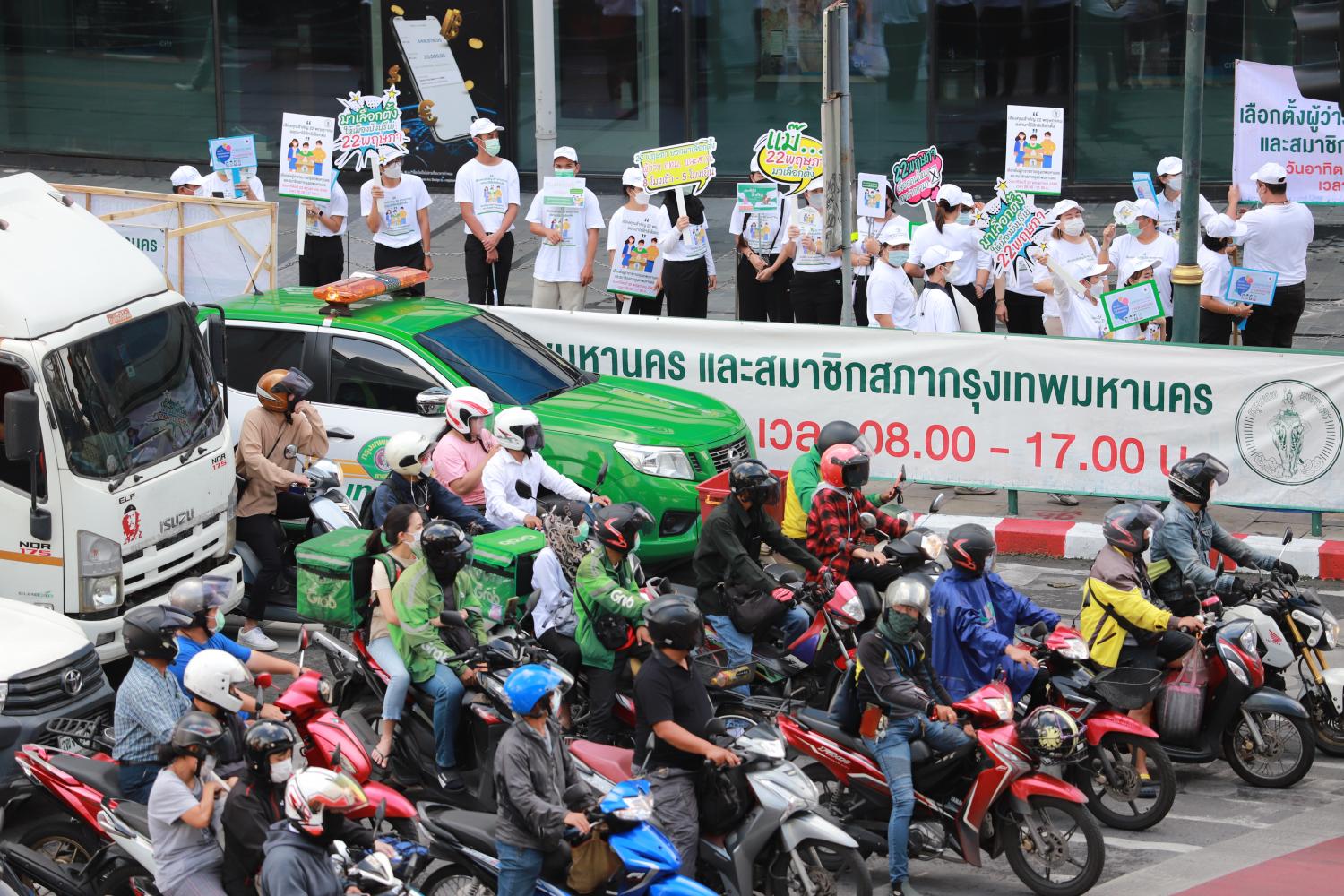
After a nine-year hiatus, Bangkok residents are more than eager to decide for themselves tomorrow who should be running the capital.
Sunday's election looks set to be phenomenal. With tight competition, it will be one of the fiercest polls in Thailand's political history, with individual candidates using all of their bags of tricks to woo over 4.4 million city voters. The Election Commission (EC) expects a high vote turnout of around 70%.
Key candidates are categorised into two groups. One one side are the so-called "progressives". This includes Chadchart Sittipunt, who so far tops all the opinion polls, and Wiroj Lakhanaadisorn of the Move Forward Party (MFP), who has taken leave from national politics for this mission.
On the other side of the political spectrum are those in the "conservative" faction, namely Suchatvee Suwansawat, who represents the Democrat Party, while Aswin Kwanmuang, Sakoltee Phattiyakul and Rosana Tositrakul are independent candidates. They share an anti-Thaksin Shinawatra sentiment.
The ongoing race clearly shows that Thai politics remains shrouded by colour-coded divisions. This means political conflicts run too deep and reconciliation is highly unlikely. In order to discredit their opponents, some candidates have not hesitated to cash in on divisive rhetoric to maximise their gains.
Over the past two months since the poll campaigns formally began, Mr Chadchart, who kickstarted his rally long before the other candidates, has been treading carefully, trying to avoid any risks, especially those related to questions about whether he is truly independent, given his affiliation with the Pheu Thai Party. Lest we forget, he once was a Pheu Thai candidate for the premiership.
Both sides are giving Mr Chadchart a hard time. The MFP Party has lashed out at Mr Chadchart's pro-democracy stance, questioning its credibility while also criticising his idea about setting aside protest sites, saying this fails to recognise people's right to demonstration. Mr Wiroj, who trails closely behind the former transport minister in the opinion polls, has a strong base among younger voters who have been vocal in their call to reform the country's key institutions.
Should either of the two triumph tomorrow, it would send a seismic shockwave to the government of Prime Minister Prayut Chan-o-cha, whose popularity is going downhill. It's no exaggeration to to say that tomorrow's polls come at a bad time for the government, which is riddled with problems. In fact, if Gen Prayut had given a green light to early polls, when he and the military-leaning party were arguably more powerful, the ruling Palang Pracharath Party (PPRP) may have had a better chance of attracting candidates with more potential to secure victory. The decision to delay could end up costing the PPRP dearly.
Now the final countdown has begun, conservative elements are struggling as they try to push for "strategic voting" -- where voters ditch their preferred candidate and opt for their second choice in a bid to block another candidate who they dislike from securing victory. The Democrat Party used such a strategy in the last gubernatorial election, which enabled MR Sukhumbhand Paribatra to beat Pongspat Pongcharoen who was running under the Pheu Thai banner.
Seree Wongmontha, a communication guru and staunch supporter of Gen Prayut, urged supporters of the four conservative candidates to consider adopting this voting strategy and pour their support behind one potential winner.
But the conservative side is too fragmented. There are reports the ruling PPRP is divided between Mr Aswin, who is said to be tacitly endorsed by Gen Prayut, and Mr Sakoltee, who is Deputy Prime Minister Prawit Wongsuwon's choice.
Mr Sakoltee, a key figure in the now-defunct People's Democratic Reform Committee (PDRC), also has the support of several new yellow-shirt leaders like Nattapol Teepsuwan; while Ms Rosana is backed by older yellow-shirt members like Maj Gen Chamlong Srimuang.
No candidates have agreed to step aside to facilitate strategic voting, and the Democrat Party would never accept such a voting pattern. The party, which is facing its "sunset moment" following a sex scandal involving one of its former top executives, hopes that Mr Suchatvee can restore the party's past glory. Even if doesn't win, he still has a solid political future ahead of him.
I hope all of the candidates ignore calls for such a voting strategy, which will not benefit the country in any way. Voters should pick a candidate based on their ability to run the city with an annual budget of around 79 billion baht.
Despite this huge budget, the city governor only has limited administrative power and must defer to the ministries that report to the central government. More work is needed to make Bangkok a more independent city. Hopefully, tomorrow's election will inspire people in the provinces to see there is a chance of a more decentralised form of administration.
It's not surprising that some people are treating tomorrow's race as if it's a general election, not a local one. While Bangkok is the centre of the national administration, many see the long-awaited polls as a proxy war, a duel between the government and the opposition. Both sides are fielding candidates for the 50-strong city council, and the results will set the stage for the next general election this year or next.







